
VOL. I. No. 19 - JULY 14, 1944 FOR U.S. ARMED FORCES PRECENSORED FOR MAILING

The 10th USAAF has moved its headquarters from Calcutta to Assam, and is now operating as a distinct unit within Easten Air Command, it is announced by Major General George E. Stratemeyer. Maj. Gen. Howard C. Davidson, Commanding General of the 10th Air Force, has relinquished his post as Air Commander of the Strategic Air Force, Eastern Air Command, which remains at its old headquarters, and has been replaced by his former deputy Air Commodore F. J. W. Mellerah, A.F.C. The headquarters of the 10th Air Force has moved twice within eight months and is now only a litle more than an hour's flying time from enemy installations in Northern Burma. Originally set up in New Delhi in 1942, the organization moved to Calcutta in late 1943. The latest move was undertaken at the start of the monsoon season and despite heavy rains was carried out successfully according to schedule. Personnel and equipment were sent by air, rail, water and road, and although the transfer took a total of two weeks there was no interruption in operations. Neglect Biggest Tire Wear Cause Captain J. C. Williams, Base Automotive Officer, this week warned all poersonnel and organizations responsible for vehicle operation, that the supply of new automobile and truck tires for CBI is virtually exhausted and that "unless far more effort is put forth to preserve tires than there has been in the past, this theater is going to be in very serious difficulty." Inspection by Base Ordnance Inspectors reveals that tire neglects exceed all other mechanical defects combined. In the Commandtown area alone over 100 tires a week are being salvaged or repaired for breaks in the cord body. Most of these show little wear on the tread. This indicates premature tire failure and can be traced to abuse and neglect, Captain Williams said. Suggesting frequent inspection of tires, close checks on air pressure, and care in mounting new tires, Captain Williams pointed out that incorrect application of brakes are a source of much tire trouble. "Braking causes the tire to drag on the pavement and wear out quicker. Don't use brakes except for emergency stops and parking" he said. Newly manufactured synthetic rubber tires, while adequate for all light vehicles, have not been perfected to the point where they can be used on heavy trucks, it was pointed out. |
STILWELL'S COMBAT HEADQUARTERS, July 13 - The tempo of the ground fighting in the Myitkyina area quickened this week as both sides launched attacks. General Stilwell's American-trained Chinese troops attacking from the west, southwest and south gained new ground while the American troops on the north of the town threw back an enemy attack and inflicted heavy casualties on Monday.
On Tuesday enemy fighter planes tried to raid targets in the Myitkyina area but American planes intercepted the enemy and drove them off before they could reach their objective. A press not from General Dtilwell's headquarters on Wednesday reported local gains by the Chinese troops. American planes concentrated their attention on bombing targets in and around the town of Myitkyina in heavy attacks.
West African troops of the Chindits together with Chinese troops in a combined attack from the north and south captured the village of Yindaw, approximately 8 miles west of Mogaung, says a press note issued from General Stlwell's Headquarters in India.
Other Chindit troops continued their clashes with Japs in the hills 8 to 15 miles southwest of Pyindaw.
Chinese patrol which started from Mogaung and has been moving along the main railroad has reached the Myitkyina area. In the southern section of the town of Myitkyina additional local gains were made. American aircraft were out in force and carried out heavy bombing attacks north of Sitapur.
Gurkha troops and Kachin Levies, moving south out of the Fort Hertz Valley, attacked and occupied Jap positions on the south bank of the Nsop River near Nsopzup.
KANDY, July 13 - The following is today's S.E.A.C. communique:
Along the Imphal-Ukhrul road retreating Japanese split into disorganized and isolated bands are still being wiped out or captured. With most of the escape routes to the south closed the number surrendering is increasing. Sangshak village ten miles southwest of Ukhrul where one group prepared to make a stand was abandoned at our first assault.
"The enemy position on the road has further deteriorated through a linkup by our troops pushing northeast from Imphal with men of the Devon Regiment holding a road block at Lamu ten miles from Ukhrul.
"In the Bishenpur area more features overlooking the Silchar Track have been cleared. Men of the West Yorkshire Regiment have gained a foothold in Khunou foive miles south of Bishenpur and are attacking with troops of the Seventh Gurkha Rifles. Stiff oppostion is backed by tanks and artllery but three tanks and one 47MM have been destroyed.
"Five miles east of Palei the enemy after suffering casualties have withdrawn from the whole of the Maibi Khunou ridge dominating the Palel-Tamu Road from the north."
|
LEIYANG JAP FORCE ERASED BY CHINESE CHUNGKING, July 12 - The Japanese force south of Leiyang, a town south of Hengyang has been wiped out by the Chinese. Elsewhere, the Japanese are counter-attacking strongly at points northeast of Hengyang. Further north, the Japanese fought their way into the city of Liling, forty miles southeast of Changsha, Hunan capiotal. Street fighting is going on inside the city. |
NEW ORDNANCE AREA IS FORMALLY OPENED
A Flag Dedication ceremnoy and formal review were held recently to formally open the newly designated Ordnance Ammunition Area near Commandtown. The commanding officer of the new area is Major Raymond Constabile.
Present for the occasion to review the men of the Ordnance companies stationed there were Brig. Gen. G. X. Cheves, commanding general of Base Section and his staff, Col. D. L. Crane, commander of troops for the Base Section, Lt. Col. A. M. O'Dell, Major G. Dewey, and Chaplain Arthur Crowell.
Music for the occasion was furnished by the Base Section Military Band. Following the cermony the General and his party attended a special dinner in honor of the occasion.
|
ATC STATION 6, INDIA - Two medical officers who recently parachuted into a mountaintop village are credited with saving the life of an India-China Wing, Air Transport Command, pilot whose plane crashed in the jungle.
The men are Capt. Gilbert A. Towle, Chicago Heights, Ill., a physician and 1st Lt. Owen J. "Sandy" Morrissey, Duluth, Minn., a medical administrative officer. They are given credit by Lt. Col. Edward A. Abbey, New Haven, Conn., wing surgeon, for saving the life of 1st Lt. William D. Schoensee, Twelve Acres, White Sulphur Springs, W. Va.
The Rescue Squadron at this base was notified of a missing plane. Abbey, who was directing rescue operations, selected Towle and Morrissey for the flight - Towle because of his medical knowledge and Morrissey because of previous experience in the jungle.
Abbey's ship found the missing plane in wreckage on the side of the Himalayas. It was three days before the rescue party discovered the whereabouts of the crew which signaled its location by spreading a parachute on the ground in the center of a native village.
Before Abbey would give the order to jump, he determined by means of signals from the ground that medical attention was needed to save life. It was the first bail-out for both Towle and Morrissey. Unlike paratroopers, who leap from slower planes, these novices had to jump from a fast-moving B-25 medium bomber used in rescue work. Abbey gave the signal and the officers slid from the rear belly hatch, landing about a quarter mile from the vilage - Morrissey in a tree from which extrication was difficult and Towle in eight foot grass.
The rescue ship dropped two medical packs by parachute which landed squarely in the village. The packs contained surgical instruments, plasma, splints and such medicaments as morphione and sulfa drugs. Abbey made certain the rescuers had landed safely and needed no more suppklies before departing.
Towle and Morrissey found survivors of the crash in the village. Schoensee was suffering from a fractured skull, broken arm and many fractured ribs. Sgt. Robert Daniels, the radio operator, also had serious injuries, and Sgt. Arthur C. Gorgas, crew chief, had been shaken up, cut and bruised. The co-pilot, 2nd Lt. B. K. Forston of Wichita, Kans., had bee killed instantly in the crash.
Gorgas, the medical men learned, had had sufficient strength to assist and supervise the natives in getting his crewmates to the village. He also handled the ground end of the panel signal communication between rescue plane and crew. Schoensee said Gorgas's efforts and the skill of the medical men were responsible for saving his life.
The rescue ship circled the area of the village daily to drop additional supplies as needed. Among material dropped were jungle hammocks with nets to kkep off leeches and other pests in the long walk out after the men had recovered sufficiently. It took 12 days for the injured crew to reach a small landing strip where a tiny L-5 plane was able to land and pick up the men one by one, and remove them to a hospital.
Only two other medical officers and two sergeants ever before had leaped from a plane to treat airmen injured in crashes on the "hump" run, Abbey said.
|
HEADQUARTERS, ICW ATC - The Soldier's Medal and the Bronze Star award were presented to two India-China Wing, Air Transport Command, officers last week by Brig. Gen. Thomas O. Hardin, commanding general.
Recipient of the Bronze Star was Capt. William C. Loveless, Decatur, Tex., assistant aircraft maintenance officer of the wing, and 1st Lt. Chester M. Epstein, Cleveland Heights, Ohio, received the Soldie's Medal.
Captain Loveless was cited for "extraordinary and meritorious service" in successfully readying 25 transport aircraft, complete with crews and all operational servicing and equipment, from ICW ATC stations for a special urgent assignment. The project was organized and the aircraft readied for operation within eight hours. Loveless directed operations "with eminent success," the citation said.
The captain's mother, Mrs. Minnie P.Loveless, lives in Decatur. Loveless attended Texas Institute of Technology and prior to entering the army was associated with a finance company in Lubbock, Tex.
Lieutanant Epstein was honored for his part in a display of heroism by personnel at an Assam ATC base. A transport plane, heavily loaded with explosives and gasoline, crashed and burned, with crew members on board. Epstein, according to the citattion, "attempted to render aid to any possible survivors although in imminent danger from exploding bombs and burning gasoline."
Epstein, now an executive in the wing statistical control section, is the son of Isadore Epstein, Cleveland Heights. The lieutenant was a buyer for his father's shoe company before joining the army. He attended Western Reserve University and Dyke College.
In the presentation General Hardin paid high tribute to the ingenuity of the officers in actions which, he said, "typify real Americanism and set apart the American army from any other army in the world."
|
Three Transfers In ATC Commands
HEADQUARTERS, ICW ATC - A three-way transfer of officers of the India-China Wing, Air Transport Command, has placed Col. Clyde McCall in the role of assistant chief of staff, operations; Lt. Col. Richard F. Bromiley, deputy wing commander, western division, and Lt. Col. Charlie F. Skannal, commanding officer of Station 19. Colonel McCall, Ft. Worth, Texas, has held the western division post in which Bromiley will succeed him, since April. Prior to that he was assistant operations officer of the ATC's European Wing and earlier was operations officer of a station in that wing, and assistant chief of staff, operations, of the South Atlantic Wing. As a civilian McCall was first pilot for Ameican Airlines, flying out of New York City from 1930 to 1942 when he entered active service with the army. In 1930 he was chief pilot for Curtiss-Wright Flying Service at Memphis, Tenn. He has been flying since 1926 and has logged 12,000 hours in commercial aircraft. Bromiley became CO of Station 19 in May. At 28 he was one of the youngest commanding officers in the ICW ATC. A West Pointer, Bromiley stepped into the Station 19 position after serving as operations officer of western sector. He took flying training at Kelly Field as an officer and then became flight instructor there. He served later as commanding officer of a training detachment at Ocala, Fla., director of flying at Gunter Field, director of training, and finally CO at Newport, Ark., and air inspector with the Second Air Force at Ardmore, Okla. Skannal, of Denver, Colo., who takes Bromiley's place, has been assistant chief of staff, operations, of the ICW ATC since April. Before that appointment he served as wing accident investigation officer, operations officer for the Caribbean Wing at Miami, base operations officer at Miami's 36th Street airport, pilot on special missions and head of an aircraft operations unit for the ATC headquarters in Washington back in 1942. |
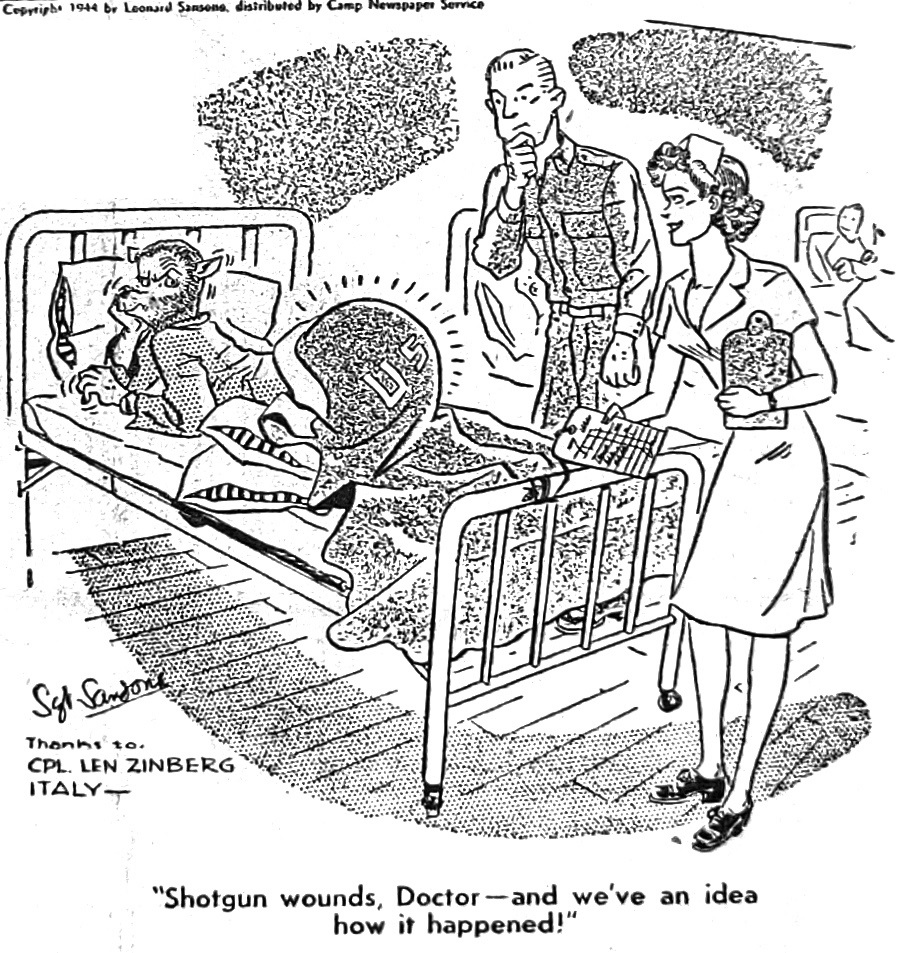
|
T/7 Hank Gould
BIRTHDAY PICNIC GOOD
PLACE FOR HANDING A LINE
Today was Arabella's birthday and I just couldn't wait for it to end. Those darn coolies of mine - everytime I give one of them enough training to handle an American broom, he's taken away from me and put in a higher echelon. I can't even teach them to iuse a wheel barrow right. The other day I was issued one, after signing about fifteen documents and promising to supply a pint of my blood. I brought the barrow to my coolie laborers to use for hauling dirt. The next thing I knew, I saw two of them picking it up and putting it on another native's head, to carry it away. That's the things I have to put up with on my job. But I don't mind it too much. Last week I was promoted. Now I have five more coolies to take care of.
Well the work day was over, and I was sure glad of it too. Arabella and I had a swell evening planned. We were going to have a picnic out in the country. The catch to the whole thing was that she invited some friends and told me to ask Abdul to come along. It was planned to be a Happy Birthday Picnic. Of course Abdul had to bring Maisie Gupta along.
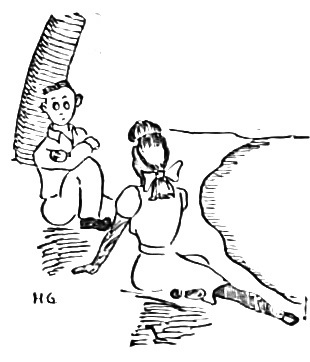
|
I took my shower, got dressed and Abdul an I were on our way in less time than it would take Hedy Lamarr to pick up a date in Commandtown. I had to send Abdul to pick up the girls. If I went the MP's would probably pick me up.
While I waited on the Main Drag, I was planning in my mind how the picnic would pan out. I didn't have much planning accomplished, when Abdul pulled up with the gals. I asked where all her friend were, that she said she invited. She said, "Oh, they couldn't come." "Why?" I asked. She looked at me and said, "Did you ever have Prickly Heat?" I was glad that they couldn't make it, but I told her that I was sorry. That made her feel good.
Abdul and I hailed a couple of Rickshaws and piled the gals in. Then we were on our way. It was a beautiful day for a picnic. We finally found a nice spot alongside of a small stream. We all helped to clean up the spot a bit and Arabella fixed up the lunch, which was chapatti and dhal. These Indian dishes are great morale builders. The makle you really appreciate the G.I. food.
As soon as we laid the food down, a thousand and one ants started crawling around. Everyone seems to think that ants are busy little creatures, but I don't think so. If they were so darned busy, where in the heck do they gety enough time to go on all these picnics.
After the meal, Abdul and Maisie decided to take a walk and enjoy the sights of Mother Nature. I was glad they left because now I was alone with Arabella. We wee sitting bare-footed by the stream with our little tootsies dangling in the water. She broke the silence by asking: "Is it true that all Americans are Rhajas?"
I didn't want to break her beautiful dream and tell her that when I get back I'd have to start selling yoyos in Woolworth's
|
I figured as long as I was going to pay the rickshaw wallah on the way back, that I'd add a little more gravy to her already exaggerated opinion of Americans. Arabella asked me if I took many cruises to Bermuda like aome of the movie stars she read about in a movie magazine. I told her that I dodn't take too may of these trips. "Of course," I said, "It wasn't the money part that stopped me. It was because I was so darn busy at the office." I told her that when I got back, if things weren't too busy, that I would take a six month vacation.
Just then Abdul and Maisie came back from their sight seeing tour. I had to change the subject, now that Abdul was back. He knows me too darn well and might make a slip. But Arabella just couldn't get her mind off Uncle Sugar with all the Rhajas. She kept asking questions.
The sun was beginning to set so we packed up and started back. Everything went along swell until Arabella asked, "How come you never ran for President of the United States?" Gee, I guess I really laid my line on thick. I didn't know know what the heck to tell her. Then finally it came to me. I said, "The only reason why I wouldn't want to be President is that there is no chance for promotion."
I sure am glad Arabella don't know anybody else from my hometown that knows me.
“Fireball” Flies US-India Route in Eight Days
PHILADELPHIA (By Cable) - The "Fireball" air-freight line from the U.S. to India manned by U.S. flyers, is the "backstage reason for much of the recent success of our air force in the China-Burma-India theatre," says David G. Wittels, foreign correspondent, writing in the July 1st issue of the "Saturday Evening Post."
Wittels said, "The Fireball is a sort of emergency ambulance for tired battle-scarred planes. It rushes critical parts from Miami, Florida to a secret base in Norheastern, India, nestled against the towering Himalayas, and makes the round trip of 28,000 miles - the linear equivalent of more than around the world - in as quickly as eight days.
"The Fireball operates like the old Pony Express, only in reverse. Whereas in frontier days the riders changed ponies, in the modern version the crews stop over and the planes keep going. The crews snatch some sleep at relay points - the African Gold Coast, Natal, Arabia, Port of Spain - then are immediately alerted again to be ready for the next Fireball plane."
Wittels, who rode the Fireball on a return flight to Miami, says that the route was established so the U.S. Army Air Force could maintain its atrength and adequate installations in China for the war against the Japanese. Over the route go not only plane engines but such tiny things as a carburetor spring three-eighths of an inch in size weighing a fraction of an ounce. The planes used on the route are Liberator Expresses.
Maj. Gen. Harold L. George, head of the Air Transport Command, directed Brig. Gen. William H. Tunner and Col. Temple G. Bowen, in charge of the U.S. Air Forces ferrying division, to set up a direct service to India. They called in Col. Joseph G. Mackey. He hadn't planes, an office or crews - but the first planes arrived in Miami in four days later and in two days Mackey had it on its way to India with a precious cargo.
|
Roger, official mascot of the First Air Commando Group, is a large Chow with a possible smattering of Alaskan Husky. During the past seven months he has accumulated more than 500 flying hours, over four continents, has participated in at least 100 combat missions over Japanese-occupied territory, and spent four days on one of the air strips behind enemy lines during last spring's airborne invasion of Burma.
Roger joined the Commandos last December at Patterson Field, Ohio. Just before one of Colonel Philip Cochran's C-47's was about to take off for the long journey to India, Roger strolled up and made friends with the crew and climbed in. From that time on he has considered himself the personal property of Lt. Frank Huxley of Ripley, N.Y., the pilot of the plane.
Roger's conduct was exemplary on the long flights to South America, across the South Atlantic to Africa, and finally to India. His first view of India was at Karachi, where he emerged from his airplane promptly to become embroiled in mortal combat with four "gook" (native) dogs. He emerged greatly refreshed, with ythe situation well in hand.
From Karachi, Rogwer visited various bases in India and put in several days at a maneuver area where the Air Commandos first became acquainted with the Chindits whom they were later to transport into Jap-held Burma. Finally he arrived at the advanced base in Assam from where these operations were to proceed.
By this time Roger had developed an uncanny sense of when Lt. Huxley's plane was about to take off and invariably the dog was on hand and waiting even before the arrival of the crew chief.
On the night of the first airborne invasion, Roger flew into Broadway. Later he visited Chowringhee, Aberdeen and every other strip operated by the Chindits and the First Air Commando Group in Burma. On several successive nights, he flew at least two combat missions, jumping from his own ship into another as it was taking off.

|
GI Help Wanted; Pay For Off-Duty Work In Calcutta
Qualified soldiers living in and around Calcutta may make some extra money during their off-duty hours by marking papers for the Army Institute.
The Army Institute conducts correspondence and self-teaching courses for American soldiers and requires men with a high school education, or it's equivalent, to mark papers in the following subjects:
English for men of foreign birth or parentage; English grammar; Business letter writing; American history; Civics (American Government); Typewriting; Shorthand, Gregg; Shorthand, Gregg, advanced; Bookkeeping and accounting; Cost accounting; Advanced accounting; Railroad rate clerk; Traffic management; Steam engineering; Aviation engines; Airplane maintenance.
Marine engineering preparatory; Marine boliers; Marine engines; Marine equipment; Plumbing; Steam fitting; Heating; Machine shop practice; Gas welding; Plumbing drawing; Heating drawing; Machine design; Electric welding; Surveying and mapping; Engineering mechanics; Water works and sewage plant operation; Carpentry; Military orders; Military correspondence; Auto mechanics.
Soldiers selected to mark papers by the Army Institute will be well paid for their efforts. Men with teaching experience are particularly desired by the institute, but others who are qualified by educartion and experience will be considered.
Soldiers interested in this offer to earn extra money while doing interesting work should write giving full particulars concerning their background experience and education, and address the appication to the COMMAND POST, Headquarters, Base Section 2.
Headquarters Men Arrive Home Safe
It's really true, now one can be sure that the thing is actually working. The first three repatriats to leave Headquarters, Base Section 2 are now safe at home, according to a letter received this week from M/Sgt. James Coleman of Detroit, Michigan and Pfc. Edward Hornbeck. THey left CBI recently and arrived home July 3rd.
All three had served more than two years overseas and were included in the first CBI quota to return hoome under the War Department's new troop rotation plan. Since the departure of this first small group several other lartger contingents, select from units in and around Commandtown have also bee repatriated. One group from a local port company including over three hundred men.
15 Men Get Good Conduct Award
Fifteen Enlisted Men received the Good Conduct Medal, upon having completed one year in the Army, last Wednesday evening at a retreat ceremony held in Commandtown. The wards were made by Brig. General G. X. Cheves.
Major H. L. Decker, new Headquarters Commandant, commanded the troops, and the occasion marked the first appearance of the flag, flying from the newly cinstructed Headquarters Company flagpole.
Men receiving the Good Conduct Medal were: M/Sgt. Carl Dent, Spartenburg, S.C.; M/Sgt. Abraham Mitchell, Wilkes Barre, Penn.; T/Sgt. Roger Perry, Janesville, Wis.; Sgt. George Eger, Merchantville, N.J.; Sgt. Ross Newton, Hyde Park, Vt.; Sgt. Gumesindo Casanova, Harlingon, Tex.; Sgt. Grant Miller, Portland, Ore.; Sgt. Henry Nevin, Cambridge, Mass.
Corp. Elmer Johnson, Hardy, Ky.; Corp. Robert Webb, Beaver Falls, Penn.; Pfc. Isadore Suravitz, Dallas, Tex.; Pvt. John Carey, Baltimore, Md.; Pvt. Jessie Harris, Memphis, Tenn.; Sgt. Charles Huff, Owensboro, Ky.; Pfc James Duncan, Louisville, Ky.
|
ATC STATION 4, INDIA - It's a long step from witchcraft to well-drilling but Maj. Hicks W. Sellwrs of Ama, La., a four-engine pilot at this base of the India-China Wing, Air Transport Command, became involved with one because of his knowledge of the other.
It started months ago when Indian contractors pronounced that "evil spirits are sticking in the pipes" when they found it impossible to sink pipe for a well below the 100 foot level. As the water shortage was becoming acute, personnel at the base was inclined to agree with the Hindustani-speaking natives - until Major Sellers went to work.
Being a well-drilling contractor in Louisiana as a civilian, Sellers volunteered to sink some wells. He obtained some three inch pipe for a derrick, made a block and tackle and built a bit and screen in the base welding shop. It wasn't long before his apparatus was clanking away and he had provided an ample water supply.
As word of his well-drilling exploits spread, numerous requests were received from neighboring army posts for the major's services. With the assistance of Cpl. Martin F. Murphy and Pfc. Salvatore P. Giambrone, Sellers has sunk many wells since his initial efforts got rid of the "evil spirits."
His latest assignment near the Burma frontier is designed to provide water for soldiers who are busy fighting the Japs.
In addition to his well-drilling accomplishments, Sellers is regarded highly by GI's for his construction of a hot water system by converting a locomotive boiler that hadn't been used for ten years.
The major is the son of Mr. And Mrs. T. H. Sellers of Ama. He attended the Southeastern Louisiana Institute and prior to entering the U.S. Army Air Forces, served nine months with the RCAF.

|
|
"Blue Skies" is the title of the latest Continental Service Club show now touring the Commandtown area. Produced and M.C.'d by Jim Moody, the show introduces some new talent including some charming young ladies. Heading the list of girl performers is Sally Jackson, who has recdently earned the title of "Sweetheart of Song." The Robertson Sisters, popular harmony singers, and Shirley Frederico, talented Miss, who dances and sings, are also featured. Miss Frederico has appeared in several dances with her partner Tom Scheurer, U.S. Army, and formerly with Paramount Studios in Hollywood. Sophie the "Safety-Pin Up Girl" is a big surprise, 240 lbs. of it. Also featured are "Winnie the Wac - (I)," Bert Gilbert, Comedian; Chris Marvel, Magician; Tex Welsh, a Yank in the R.A.F., comedian; George Easton, singer; Jackie Fearns, comedian, with the Sextet, to round out the show. |
|
HEADQUARTERS, ICW ATC - A score of war-weary lads of the India-China Wing headquarters of the Air Transport Command who are being "rotated" to Shangri-La will be guests of honor at an "Uncle Sugar EM's Dance" Friday night, July 14, in the Prince's room of a Commandtown hotel. The dance band composed of personnel from ATC's Station 19 will provide the syncopation for the affair. A buffet dinner will be served, starting at 7:30 p.m. Members of the committee staging the jamboree include T/Sgt. Dan Gresham and Don Carlson; S/Sgts. Walter Herd, Ralph Hudepohl, Phillip Stein, Jack Halligan, Leonard Besser and Jimmie Collins, and Sgt. Richard Bruhn. |
|
Had Busy Month Over 20,180 Officers and Enlisted Men attended Church services held at various camps and stations in Base Section No. 2 during the month of June, according to figures released this week by Base Chaplain Thomas A. Whelan. Exact figures compiled from the regular monthly report submitted by all Chaplains were: Service coinducted 314; Protestant attendance 9,985; Catholic attendance 9,182; Jewish attendance 1,013. Besides these figures one baptism and nine funerals were conducted in addition to numerous Special Service activities and hospital visitations. "It must be emphasized that these statistics do not include personnel who attended the numerous civilian churches in and about Commandtown, nor does it include Air Corps personnel" Captain Whelan said. Of the 12 assigned Chaplains in the Base Section, eight are Protestant, three are Catholic and one Jewish. |
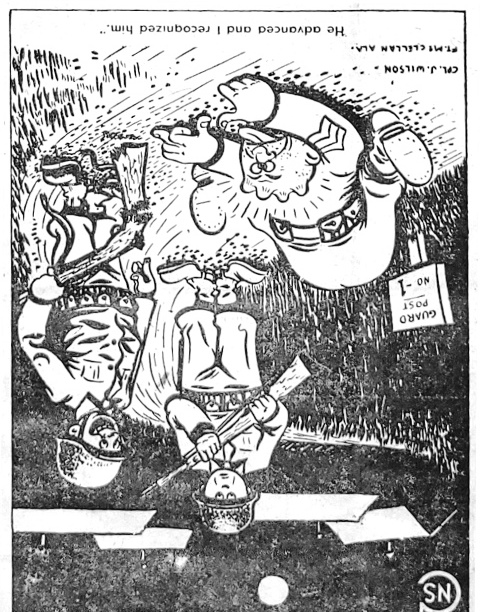
|
Hunters Shot Barbecue Fare
ATC STATION 19, INDIA - It took a little hunting expedition to turn the trick but the GI's had barbecued pork at the celebration last week in preview of their new dayroom to be opened soon at this base.
The party on July 6 included a feast, not only of pork, but of barbecued beef and chicken as well, with 100 cases of ice cold beer for a wash, but the story really starts on July 5.
On that day a quartet of officers sallied forth in quest of game for the affair. The "hunters" included Maj. Charles C. Montgomery, Wilkes Barre, Pa., flight surgeon; 1st Lt. Thurman Nuse, Englewood, N.J., provost marshal; Capt. Howard J. Bourwll, Los Angeles, mess officer and Capt. John Wax, Detroit, medical officer.
The riflemen returned lugging a 250 pound wild boar which they shot in the woods near here. The carcass was dressed and readied for the barbecue in plenty time for the following night's preview. Formal opening of the dayroom is expected to take place in about two weeks, according to 1st Lt. N. Robert Wellens, special service officer, who arranged the party.
He said plans are being considered to make similar parties monthly affairs. The Station 19 Swing band performed at the preview and also provided music for the noon meal in the mess hall three days each week, according to Wellens.
|
This Week On VU2ZU
The second of the weekly air dramatizations of the CBI "Theatre of the Air" will be presented on Wednesday night at 8:30 p.m. from the newly constructed Studio 'B' at Station VU2ZU. This weeks play is "An American Is Born," by Arch Obler.
Information concerning the play or special studio passes to see the air dramatization may be obtained from Miss Cyrilla Anderson, Program Director at the ARC 'Burra' Club.
Members of the cast for next Wednesday's performace are: Pvt. Alexander Epting, New York City, S/Sgt. William Leavitt, New York City, Pvt. John J. Brady, Chicago, Ill., S/Sgt. Vance A. McLean, Jersey City, New Jersey, Sgt. W. McGrady, and Cpl. Fred Liteenta.
Any enlisted men who are interested in dramatics, have had experience and feel that they are qualified to take a part in future presentations of the "CBI Theatre of the Air" may secuee information about them from Miss Anderson at the ARC or from Sgt. Edward Belford at Station VU2ZU.
VU2ZU, the Armed Forces Radio Station is heard daily from 1500 hours to 2300 hours on a frequency of 1355 kilocycles and a wave length of 221.4 metres on your dial.
|
THE C.B.I. ARSENAL OF DEMOCRACY
(TEXT FROM GRAPHIC BELOW)
The China-Burma-India Theatre holds first place in the world for the handling of vitally needed materials of war. And Base Section 2's men and machines at work on the U.S. Army docks at Calcutta deliver world's records along with the great volume of supplies they speed to every corner of CBI-land. Leadership is no novelty to these men, rather it is a continuous performance; the Cavalcade of Calcutta. or ten consecutive periods, up to June 15th, 1944, their efforts have won CBI top honors for net cargo discharged. During the same period they placed first five times on gross cargo discharged and three times on improvement registered over past performances. The latest figures released by the War Department's Chief of Transportation, gives CBI first place in all three classifications. U.S. Army docks at Calcutta never rest; three eight hours shifts keep supplies flowing continuously from ship tp shore to soldiers. The efficiency with which Calcutta's arsenal of democracy functions is a tribute to Yankee teamwork; to the port batallions who unload the ships; to the truck companies who haul the cargo; and to the depot troops who receive and reship it to final points of detination. Nine days is the average number required by U.S. Army ports throughout the world to unload a ship. The Base Section 2 - Calcutta average is five days. Skilled soldiers as well as record-breakers....here are the men and machines whose combined efforts are helping to beat the Japs. |
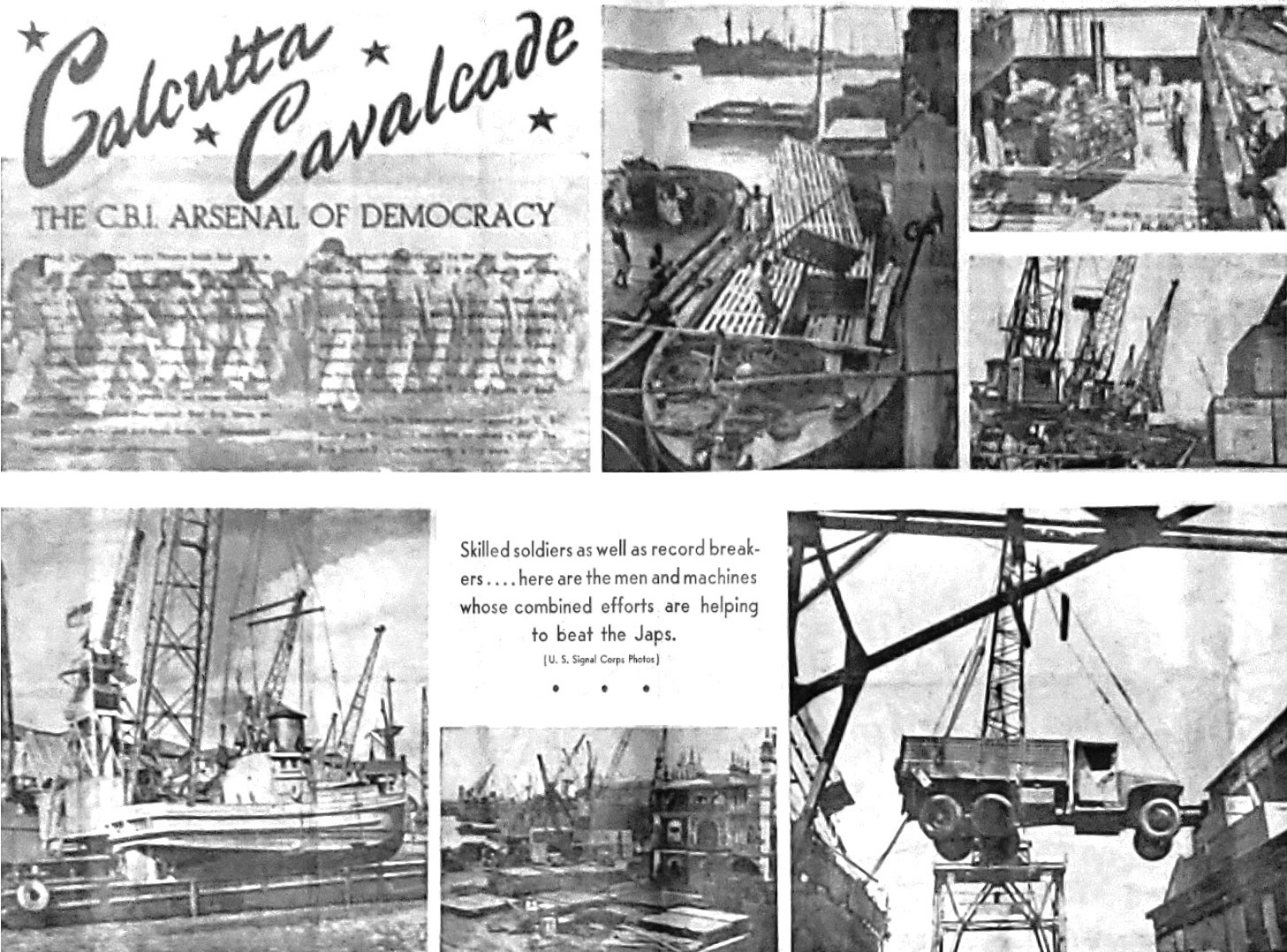
TOP LEFT (BACKGROUND) - Soldiers first, last and always. Calcutta's troops in addition to their miracle-approaching logistic achievement, make a small military appearance whenever they participate in reviews and parades. Marching with the precision of well-trained Infantry. Calcutta's SOS warriors are equally adept in every branch of the military.
TOP CENTER - Crated Air Corps.equipment being loaded into small boats from an American Liberty ship, for transportation up country to Air Corps. units. Crane is part of ship's gear.
TOP RIGHT UPPER - Army personnel check the unloading of ammunition from 'tween decks of American Liberty ship. Ship's gear is employed unloading.
TOP RIGHT LOWER - Port Commission, semi-portal cranes shown unloading Air Corps.and substinence items.
ABOVE LEFT - A 30-ton U.S. Army floating crane, assembled by Army personnel is shown discharging a motor towing launch.
ABOVE CENTER - Very heavy equiment being unloaded by crawler and floating cranes. Note Mohammedan mosque in right foreground, which American officials allowed to remain when docks were being expanded. Quay cranes, and 30-ton dock cranes aere also shown.
ABOVE RIGHT - U.S. Army "6 by 6" being unloaded by use of ship's gear.
|
Tough Sweating
HEADQUARTERS, CBI-ASC - The most rugged 'sweating out' job in CBI-land undoubtedly will go down in history as the "Rotation Plan." The bubble that was suspended just out of reach for such a long time for the "two-year-olds," as the came to be knpwn, finally burst. And out of it finally came the Special Orders which sent them, the first contngent, back to Shangri-La.
It didn't take a GI long around the base to know who was on the returnee list. Wreathed in smiles, these sun-baked monsoon drenched two-year-olds suddenly appeared to have undergone complete rejuvenation. They began to eat more regularly and more heavily. That tattered part of the Buddy System which rolls out verbally, "Mind if I borrow six bottles of beer until I get mine?" was being used with greater frequency. And few GI's could turn them down - this was their BIG MOMENT. Anything under the name of celebration was suitable.
Of course, as usual, there are always several days of delay in finally taking off and during these days the boys became known as "comeback troops," but no one can say that for all the ribbing they took that they couldn't take it, so to speak.
On the eve of their departure 'Swelter Shelter,' the service club operated by the Red Cross, tossed a farewell shindig - brass band, entertainment, cake, soft cold drinks, all on the house. Adeline Mueller and Sue Prescott the ARC gals, even distributed a final momento of India - miniature elephants carved out of ivory. They were presented to the boys with the reminder that "if you ever wnt to do somethung big - wash your elephant."
Then just before they loaded themselves into GI tranportation, Capt. Edward A. Bartolina, the squadron CO, called a formation. In serious tones, reminiscent of basic training, he admonished them about certain regulations to be carried out explicitly upon their return. He handed them mimeographed instructions. Their faces were starched to funeral grimness, but the howls came loud and long when they read:
DE-OFFICIAL GUIDE FOR GI's HOMING TO UNCLE SUGAR
(Compiled expressly to enlighten the way in an ancient land where cars are driven on the "right" side of the road, where steak has never been committed of collusion with bullock cart, where the "boys" are either too young or too old and girls are plentiful, where "Set 'em up again Joe" is not met with "Nai mollem, sahib," and where "Neck, chicken?" is not a Sunday gripe in the messhall.)
1. As your ship sails through a bottle-neck channel, a large chunk of faded green metal with a twelve-foot torch at the top looms. Approaching closer, It reveals itself as something seen in miniature on the back of a two-bit piece. On this one occasion, the ARs will be waived if your emotions stir you to a rigid salute.
2. Barracks bags are NOT to be dropped in the bay. You are now back in the Zone of the Inteior and GI equipment is no longer expendable.
3. All the bronze stars won on Queensway and now attached to the Theater ribbon are to be polished to a high dregree for public admiration.
4. EMs who have won recognition for chiseling a tonga-wallah out of two (2) Annas will abide by meters found on right-hand side of taxis. This applies particularly to Delhi commandos.
5. For those who have suffered cobra bites, jungle fever, and Jing Bao delirium, special concessions are offered. They may whistle long and shrillingly after blondes with accentuated front porches.
6. Right arms are not to be camouflaged in slings. It will be presumably safe to salute every third passer-by.
7. Uniform decorations will be worn as prescribed - except for those who have sufficient funds from the seige of galloping cubes to afford the ribbons exhibited in domestic P-exs.
8. The recoil of inner-spring mattresses in the hotels will effect a strange feeling. Don't be alarmed.
9. Four-Anna pieces will not operate in cigarette machines. Your bearer will be glad to hold them for your return.
10. Remember your table manners. No adjectives are necessary in saying, "Pass me the ____ potatoes."
PRIVATE TO CORPORAL Delane Q. Powell, Dierks, Arkansas PRIVATE TO TECHNICIAN FIFTH GRADE Norris G. Capehart, Cove, Arkansas Artie E. Tanner, Nederland, Texas PRIVATE FIRST CLASS TO TECHNICIAN FIFTH GRADE Samuel Taylor, West Tulsa, Oklahoma Jesse B. Pearson, Delark, Arkansas Frederick S. Wheaton, Santa Monica, California William E. Albin, Monroe, Oregon Francis J. Munnier, Versailles, Ohio Donald C. Rouan, Cleveland, OPhio PRIVATE FIRST CLASS TO CORPORAL Leo DeMetrick, Albian, Michigan William J. Kist, Michigan City, Indiana Henry E. Lee, Neodeaha, Kansas Ernest F. Weaver, Washington, D.C. CORPORAL TO SERGEANT Virgil L. Fugle, Fort Wayne, Indiana TECH FIFTH GRADE TO TECH FOURTH GRADE August A. Masalle, Charleston, South Carolina CORPORAL TO TECH FOURTH GRADE Fletcher R. Crabtree, Eudora, Arkansas TECH FOURTH GRADE TO SERGEANT Harry M. Baker, Port Arfthur, Texas SERGEANT TO STAFF SERGEANT Robert Decatur Perry, Everett, Massachusetts Everett W. Johnson, Dunnell, Minnesota STAFF SERGEANT TO FIRST SERGEANT John F. Gerdes, Spokane, Washington SERGEANT TO TECHNICAL SERGEANT Jack H. Davis, Columbus, Ohio TECHNICAL SERGEANT TO MASTER SERGEANT Roger D. Comeau, Spencer, Massachusetts |

|

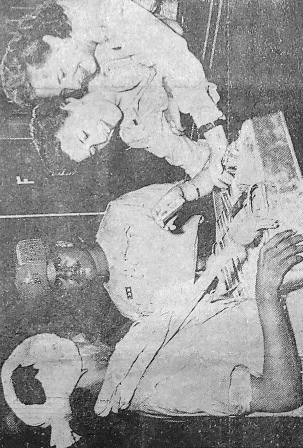 NEW ARRIVALS ARE "WALLAHED"
NEW ARRIVALS ARE "WALLAHED"Lt. Ella Mayer, Detrtoit, Michigan, left, and Lt. Jean Waldron, Frankfort, N.Y., two of a contingent of nurses who arrived in Commandtown last Sunday, examine the wares of a cigarette 'wallah' as their train chugged to a halt at the railroad station. (Signal Corps. photo) |
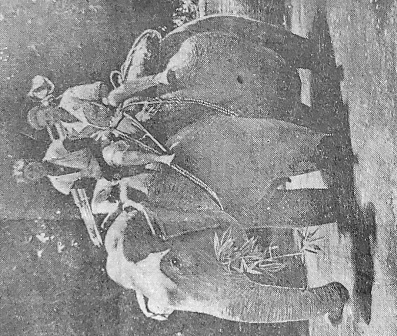 GIDDAP!
GIDDAP!Assignment in Assam on the used of elephants by a Signal Construction Battalion gave Pfc. Louis W. Raczkowski, a Signal Corps.motion picture cameraman a chance to ride one of these local versions of an amphibious jeep through the swamp and water of monsoon soaked Assam. (Signal Corps. photo) |
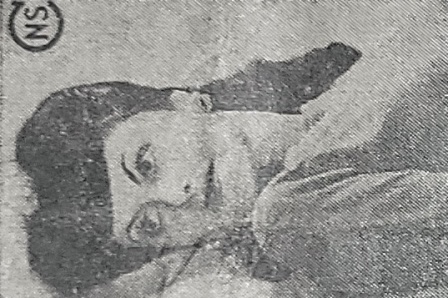 JUST CALL HER LACE
JUST CALL HER LACEGIs at Camp Kohler, Cal., think that curvy Mable Costa of Oakland, is a living counterpart of Miss Lace, make-believe heroine of Milton Caniff's GI comic strip, Male Call. What do you think? 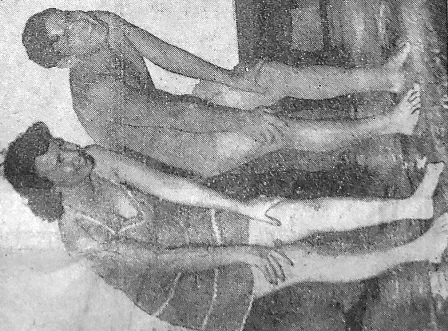 ON YOUR MARKS
ON YOUR MARKSAll set to dive into the new enlisted mens pool of the First Air Commando's are, left to right: Miss Jerry Adams, Youngstown, Ohio and the ARC, and Sgt. Robert L. Roberts, of Garderndale, Alabama. |
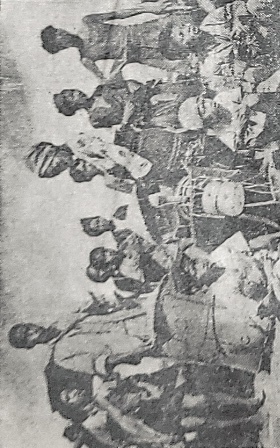 WAITING
WAITINGPatiently waiting to be thoroughly checked by the AMG officials who are with General Stilwell's forces in North Burma, these refugees stand by the side of the road interstedly watching the curious (to them) proceedings. (Signal Corps. photo) 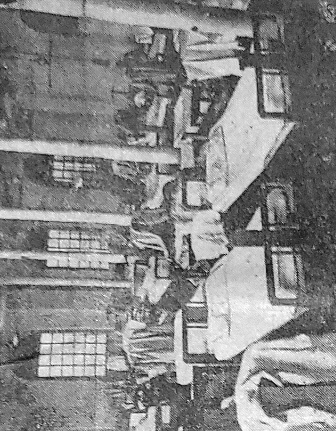 LOOKS COMFORTABLE
LOOKS COMFORTABLEGood beds are offered to enlisted men visitors to Commandtown at a low prioce at the American Red Cross Enlisted Men's Club. (Signal Corps. photo) 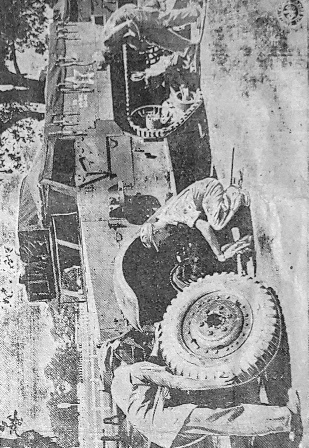 HALFTRACK
HALFTRACKThere are no halfway measures about the half-track school being conducted by the Base Ordnance Department at Commandtown. Shown working on a front wheel are, left to right: Corp. Paul Fuoco, Washingtom, D.C., and Pvt. Donald Face, Brooklyn, N.Y., both from Ordnance companies, while inspecting the track is Pvt. Fred Chandler, Detroit, Michigan, of a Bomber Maintenace Squadron. (Signal Corps. photo) |
THE COMMAND POST. Published weekly by the Headquarters of Base Section 2 for military personnel only. Lt. Lester H. Geiss, Director, S/Sgt. Harry Purcell, Editor; S/Sgt. Jesse Sincere, circulation; Sgt. Maurice Pernod, news; Sgt. Bernard Cohen, drama; Pvt. Adolph A. Reibel, reporter. Printed at the "Patrika Press"

Vol. I, No. 19 ~ July 14, 1944
Adapted from the original issue of THE COMMAND POST
Headline and lead stories are CBI-related and differ from the original
Copyright © 2023 Carl Warren Weidenburner
TOP OF PAGE
PRINT THIS PAGE ABOUT THIS PAGE E-MAIL YOUR COMMENTS
CLOSE THIS WINDOW
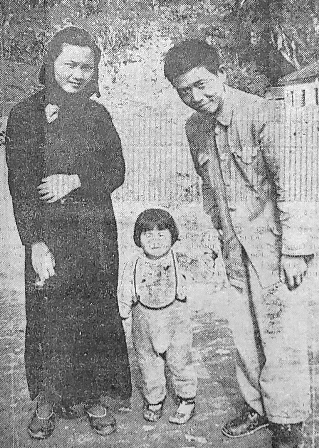 ALLIES
ALLIES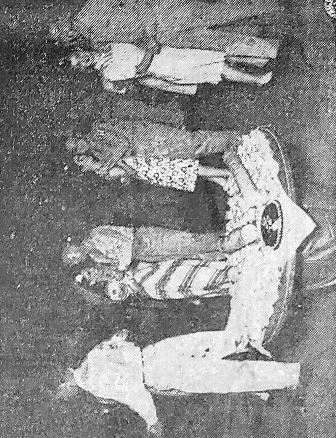 FOR THE 4th OF JULY
FOR THE 4th OF JULY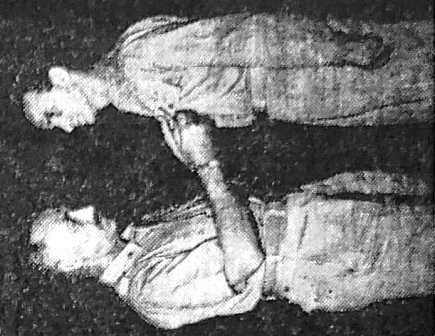 Brig. Gen. Thomas O. Hardin, commanding general of the India-China Wing, Air Transport Command, (left) pins the Soldier's Medal on the shirt of 1st Lt. Chester M. Epstein in recent cermonies. Capt. William C. Loveless also received the Bronze Star award. (ICW ATC photo)
Brig. Gen. Thomas O. Hardin, commanding general of the India-China Wing, Air Transport Command, (left) pins the Soldier's Medal on the shirt of 1st Lt. Chester M. Epstein in recent cermonies. Capt. William C. Loveless also received the Bronze Star award. (ICW ATC photo)
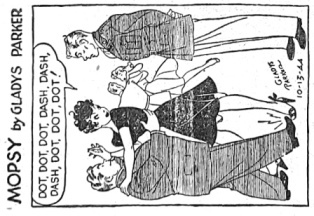
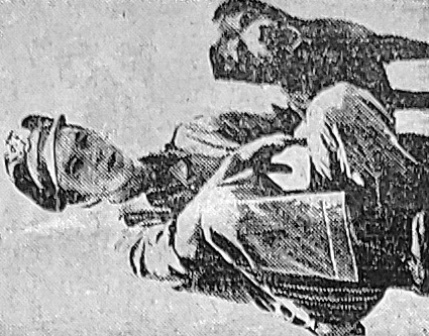
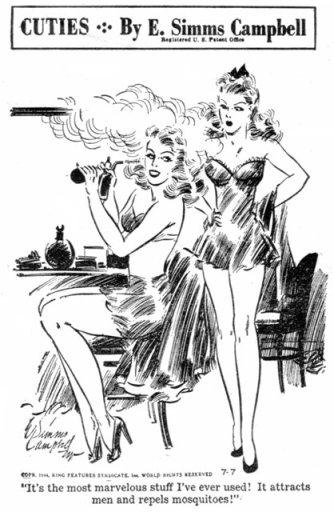
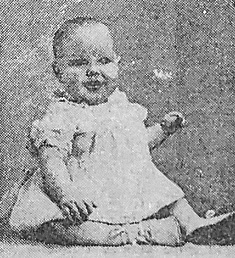
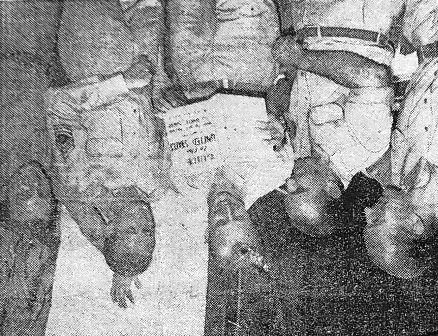 After more than two years in CBI-land, this bit of "orientation" provoked more than a mere chuckle from the firt contingent of returnees under the War Department's rotation plan. Left to right: From Hq. Sq., CBI Air Serrvice Command, T/Sgt. William M. Crane, Alexandria, Va.; T/Sgt. Henry Asher, New Orleans; M/Sgt. Clement H. Hupfer, Hastings, Pa.; M/Sgt. Harry J. Burt, Upper Darby, Pa. and T/Sgt. Martin Saidikowski, Chicago. (Photo: CBI Air Service Command)
After more than two years in CBI-land, this bit of "orientation" provoked more than a mere chuckle from the firt contingent of returnees under the War Department's rotation plan. Left to right: From Hq. Sq., CBI Air Serrvice Command, T/Sgt. William M. Crane, Alexandria, Va.; T/Sgt. Henry Asher, New Orleans; M/Sgt. Clement H. Hupfer, Hastings, Pa.; M/Sgt. Harry J. Burt, Upper Darby, Pa. and T/Sgt. Martin Saidikowski, Chicago. (Photo: CBI Air Service Command)